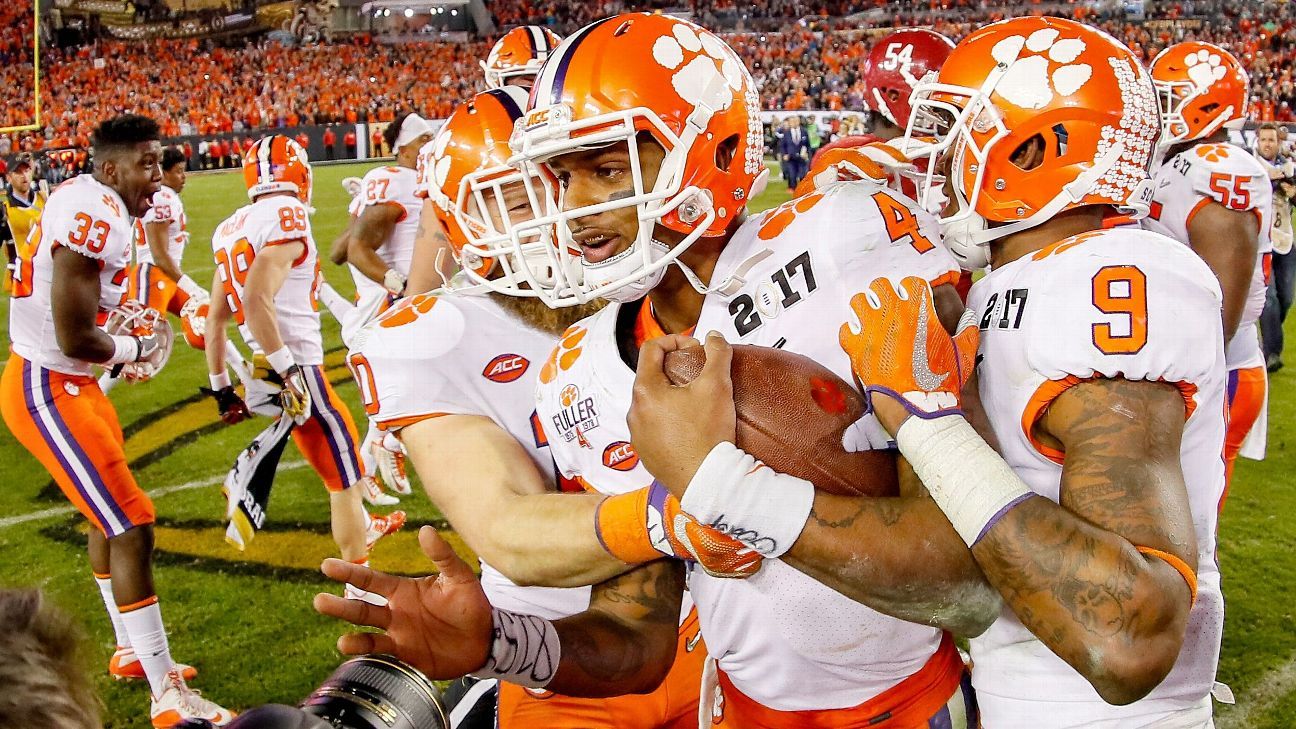The past decade of college football was defined by Clemson’s emergence as a national power. The Tigers slowly emerged under Dabo Swinney. They caught fire when quarterback Deshaun Watson was healthy. But Clemson did not officially become a giant until the team began to beat the best teams in the country.
On Thursday, ESPN (7 p.m. ET) will re-air Clemson’s unforgettable 35-31 win against Alabama in the 2017 National Championship game. It was the second of four Alabama-Clemson battles in the College Football Playoff and the one that might end up with the deepest legacy.
ESPN writers Dave Wilson and Bill Connelly look back at the Clemson-Bama series, as well as the best national title games of the CFP/BCS era, and discuss what makes a game a legitimate classic.
Besides Watson-to-Hunter Renfrow, what are your most lasting memories of the game?
Wilson: That it was the rare sequel that lived up to the original matchup a year before (Alabama’s 45-40 win). It wasn’t a game where you worried a team was going to make a mistake that doomed them. It was how good they both were. And Watson became a college football legend after getting hit, popping back up and leading Clemson to the title. He passed for 420 yards against the Tide in the process.
Connelly: My lasting memory is that 2017 was the first time I attended the American Football Coaches Association conference, which is timed to take place around the national title game. I would say at least 90 percent of the coaches in attendance were rooting for Clemson that Monday night. Even coaches get tired of the same team winning nearly every year, apparently. (The energy was not nearly as partisan two years later when Clemson won again.)
Beyond that, I simply remember thinking, “Man, Bama should have put this game away by now” countless times. Bo Scarbrough scored on two rampant runs in the first half but got hurt, and Alabama had a couple of drives stall in Clemson territory. They were holding Clemson defensively, but with Alabama up 17-7 late in the third quarter, it seemed like the Crimson Tide should be leading by about 21. Clemson then unleashed its offense and it became a track meet.
I also loved how so many key offensive players made huge plays late. Alabama’s O.J. Howard caught a 24-yard pass to set up Jalen Hurts’ 30-yard run. Mike Williams caught passes of 26 and 24 yards and drew a pass interference to set up the winning score. Lance Leggett made a gorgeous catch with 14 seconds left. Hunter Renfrow Hunter Renfrow’d. Some games are remembered for classic individual performances; this was a collective job.
Wilson: There was (understandably) some national angst about two teams from the same part of the country playing close to home in Tampa — in a rematch, no less. But I’ll never forget walking out of the press box during the game for a while so I could get out in the stands and feel how exciting this one was. Restaurants were packed with fans doing cheers for both teams in the middle of dinner during the week, and to have it all build to that fourth quarter was electric. But maybe most memorably, I hustled down to the field when it was over and saw a very large, limber man do the splits right in front of me when Christian Wilkins hammed it up for the cameras. That’s the kinda thing that sticks with you.
too. much. sauce. pic.twitter.com/iKSA1zg6w5
— ESPN College Football (@ESPNCFB) January 10, 2017
Twenty years from now, which Alabama-Clemson CFP game will have taken on the greatest resonance?
Connelly: It’s probably this one because of the classic ending and the fact that Clemson had officially arrived as a national power. If Dabo Swinney continues to win big for a generation, this was the starting point.
I can make a case for the previous year’s game, too, though. Nick Saban hiring Lane Kiffin as his offensive coordinator in 2014 represented his attempt at offensive modernization, an acknowledgement that he needed to spread things out a bit more and become more tactically flexible. The Tide lost to Ohio State in the CFP semis that first year, but broke through the next year, handing Saban his first title with the new offense. (Never mind that the offense wasn’t all that great.) So there’s symbolism there.
We’ve seen 22 national title games in the BCS/CFP era. Rank your five favorite endings
Wilson: We’ve been #blessed with some of the best finishes ever during this period.
-
1. 2006: Vince Young goes for the corner, Texas beats USC 41-38.
-
2. 2017: This one. Clemson 35, Alabama 31
-
3. 2018: Hide your eyes, Dawgs. Second-and-26. Tua comes off the bench to become an all-time legend in a 26-23 Alabama win over Georgia in overtime.
-
4. 2011: Auburn 22, Oregon 19. We had some new blood. Oregon, with its first undefeated season in 117 years, made a valiant effort at preventing a third straight Iron Bowl champion (and Alabama made it four a year later). Wes Bynum’s game-winning kick on the last play of the game gave Auburn its first (universally recognized) national championship since 1957.
-
5. 2003: Another game that ended on the last play: Ohio State’s 31-24 double-overtime win over Miami returned the Buckeyes to prominence and ended the Hurricanes’ run. Miami thought it had the game won (and probably still does). A wildly controversial (and extremely late) pass-interference call against Chris Gamble on fourth down gave the Buckeyes new life and Miami couldn’t convert from the goal line in the second overtime. It’s surely No. 1 on the most controversial endings of the era.
Connelly: I shouldn’t have let you go first in this one — now it’s going to look like I’m copying.
-
1. Of course USC-Texas has to be No. 1. But I’m actually impressed with the level of competition here. You could make the case for a few others.
-
2. I would put Alabama-Georgia a notch higher than yours, at second. The chaos levels and plot twists in just those last 2-3 minutes of regulation and two overtime possessions were nearly unmatchable. And such an incredible ending.
-
3. Clemson 35, Alabama 31.
-
4. The Ohio State-Miami thriller you mentioned. I had no problem with the pass-interference call at the end of the game. The problem was how late it was called. It allowed for a beat of celebration, which made everything that happened subsequently seem all the more devastating. But there was plenty of contact before the ball arrived. It was well within the range of what could be flagged. (It also was well within the range of what didn’t have to be flagged. Officiating is really hard.)
-
5. 2014: I’m going to go with another Auburn title game, a back-and-forth contest against Florida State that nearly ended in a miracle. After trailing 21-3 late in the first half, Jameis Winston and Kelvin Benjamin connected for the game winner with 13 seconds left to give FSU a 34-31 win. In the waning moments, Auburn attempted a miracle triple-lateral that ultimately fell short. The drama was elevated afterward when FSU coach Jimbo Fisher conceded that Auburn knew what plays were coming early in the game.
What has been the most disappointing title game so far?
Connelly: We’ve had some blowouts and some duds, but the 2010 Alabama-Texas matchup was defined by who wasn’t able to play. We talked for a month about Nick Saban’s defense versus the Colt McCoy offense. But McCoy was lost for the game on the Longhorns’ fifth snap, and Garrett Gilbert had to fill in. The simple fact that the Horns had the ball with three minutes left, down just three, tells you we could have been in store for a hell of a game. (We could also have been in store for an easy Texas win, to be honest.) But the truth is, the game was completely redefined five minutes in, and the game plans went out the window. That’s no fun.
Wilson: That’s solid logic, not to mention it gifted us the ol’ “If Colt Didn’t Get Hurt” chestnut. But I’m going to have to go with Alabama’s 21-0 win over LSU in the 2012 BCS Championship Game. It just felt so… hopeless. First, it was a rematch of two teams who ground each other to a pulp during a 9-6 LSU win just 65 days prior. This one lived up to the billing, with LSU fumbling the first snap of the game. Alabama kicked five field goals before a late Trent Richardson touchdown run, and LSU crossed midfield only once, when there were about six minutes left in the game. And to think, just nine months later, Saban asked, “Is this what we want football to be?” after facing Ole Miss‘ hurry-up, no-huddle offense. I’ll go with yes on that one.
Connelly: in a rematch of a game earlier that season, it was clear after about two LSU snaps that the Tigers were not going to move the ball in the 2012 title game against Alabama. Say this much for the team: They received a lucky break with Oklahoma State barely missing a game-winning field goal and losing to Iowa State in 2011, giving Bama a way back into the BCS race. Alabama took full advantage of it.
What makes a game a classic? Is a great ending and back-and-forth flow enough? Does it have to signify something greater?
1:44
Dabo Swinney shares what he thought was one of the tide-turning moments for the Tigers before halftime of their 2017 College Football Playoff National Championship win vs. Alabama.
Wilson: Classic games often come when the course of history is changed. Hunter Renfrow’s catch was the culmination of Clemson’s climb under Dabo, and it came in the midst of a dynasty at Alabama when Nick Saban was making a case as the greatest coach in CFB history. It’s rare when one of the time-tested bluebloods break through. Since 1990-91 when Colorado and Washington earned national titles, the list reads like a who’s who of college football. Clemson had been knocking on the door, to paraphrase Bum Phillips, and this was the year the Tigers kicked it in.
Connelly: Having that significance certainly helps. The Kick Six would have been amazing no matter what, but it was more amazing because it ended up giving Auburn a path to the SEC title and the BCS title game. The 2006 Texas-USC game is regarded by many as the best college football game ever, not only because it was back and forth and decided in the last minute, but because it featured so many amazing players and signified the peak of both Pete Carroll’s USC and Mack Brown’s Texas. (It also was Keith Jackson’s last game on the mic and played in college football’s most perfect stadium, the Rose Bowl.) You can have classics without national title stakes or narrative significance — Doug Flutie’s Hail Mary, hello — but it’s a column on the scoresheet for sure. The best games have the stories to match the on-field excitement.


